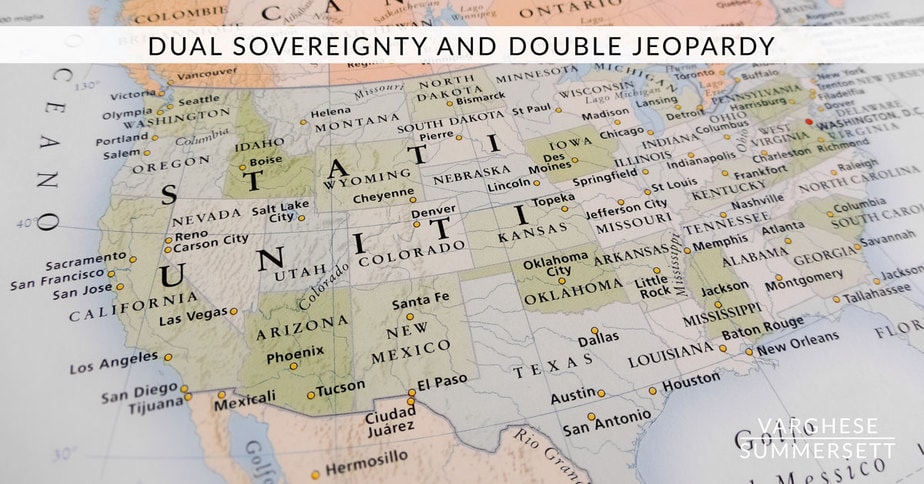
Dual Sovereignty Reigns Over Double Jeopardy | Gamble vs. United States (2019)
Gamble vs. U.S. (2019)
The Supreme Court handed down its decision in Gamble vs. United States (No. 17–646) on July 17 in which the Court declined to put an end to state and federal prosecutors punishing individuals twice for the same crime.
In its 7-2 decision, the Court declined to overturn the dual-sovereignty doctrine. While the Fifth Amendment guarantees that individuals may not “be subject for the same offense to be twice put in jeopardy of life or limb,” the state and federal government are considered separate sovereigns so each is permitted to prosecute individuals for the acts.
A Refresher on Double Jeopardy
The Double Jeopardy Clause provides no person shall “be subject for the same offense to be twice put in jeopardy of life or limb.” U.S. Const. Amend. V. Generally, a person cannot be tried twice for the same crime. Take the O.J. Simpson case. O.J. Simpson, an NFL star and winner of the 1968 Heisman Trophy, was accused of killing his ex-wife and her partner. The trial gained national attention, but on October 3, 1995, a criminal jury found Simpson not guilty on both counts. In 2007, Simpson published a book, If I Did It, in which O.J. tells a purportedly hypothetical story of how he killed Nicole Brown and Ronald Goldman. This “confession” or any other new information that investigators gathered after the trial cannot be used by California for a new trial because such actions are precisely what is barred by the Double Jeopardy Clause.
Dual-Sovereignty in a Nutshell
There has traditionally been an exception to the Double Jeopardy Clause, specifically the Dual Sovereigns Exception. In Gamble, the state of Alabama prosecuted Terance Gamble for being a felon in possession of a firearm and sentenced him to one-year confinement. While the state prosecution was pending, the federal government charged Gamble for the same offense, but under federal law. This federal prosecution was premised on the same facts that gave rise to his state conviction but charged under federal law. Gamble was sentenced to 46 months on the federal case.
The Crux of Gamble
The petitioner in this case – Terance Gamble – pled guilty to violating Alabama’s felon-in-possession-of-a-firearm statute and was sentenced to one year in prison. Federal prosecutors then indicted Gamble under 18 U.S.C. § 922(g)(1) – the federal equivalent.
Gamble filed a motion to dismiss arguing he was being prosecuted in violation of the Double Jeopardy Clause of the Fifth Amendment.
The majority opinion, written by Justice Alito, can be summarized with the following excerpt, “a crime against two sovereigns constitutes two offenses because each sovereign has an interest to vindicate.”
Justices Ginsburg and Gorsuch, an odd pairing on the surface, both wrote dissents. For now, dual sovereignty still reigns over double jeopardy.
What is a Sovereignty for Purposes of Double Jeopardy?
How is the term “sovereignty” applied? According to the Supreme Court, “this determination [whether two entities are separate sovereigns] turns on whether the two entities draw their authority to punish the offender from distinct sources of power.” In Heath, the Supreme Court reiterated that States draw their power from a different source than the U.S. Government. The Court also found in that case that States are separate sovereigns from each other. Thus, in the Heath case, the successive prosecution in an Alabama state court for capital murder during a kidnapping, subsequent to Heath’s conviction for the same murder in Georgia, did not offend the Fifth Amendment and was held to be Constitutional.
The Petite-Policy and Double Jeopardy
Are there practical limitations upon successive federal and state prosecutions? The answer is yes, but with a major exception. The Department of Justice’s Petite-Policy (pronounced like ‘pet it’ not ‘puh-teet’) generally bars the successive federal prosecution of a crime where a state conviction has already taken place. However, this is an internal DOJ rule and is not binding upon any Court. In U.S. v. Patterson, the Fifth Circuit clearly stated such.
“It has been clearly established that since the Petite policy is an internal rule, criminal defendants may not invoke it [the Petite Policy] to bar prosecution by the federal government. Moreover, there is a good reason for this view. To enforce the Petite policy against the government may encourage the government to abandon the policy, which could hardly be in the interests of justice. Since we adhere to the established rule that the Petite policy may not be enforced against the government by defendants, we must reject the defendants’ claim that they should not have been prosecuted because the government failed to adhere to the Petite policy.”
It is also important to recognize that the Petite-Policy is not a blanket ban upon federal prosecutions of offenses already resulting in state convictions, rather, the policy limits such federal prosecutions “ only where there are compelling reasons, and the prosecuting attorney obtains prior approval from an assistant United States attorney general.” See, Rinaldi v. United States, 434 U.S. 22, 28,(1977) (per curiam).
So, is there any case where a Court may bar the federal prosecution of a case where there has already been a state prosecution? Yes, but only in limited circumstances. The “Sham Test” has been applied by federal courts as an exception to the Dual Sovereignty Doctrine. The Fifth Circuit recognizes the possibility for this exception in a case called U.S. v. Moore, stating, “the Supreme Court suggested in dicta that there may be an exception to the dual sovereignty doctrine when one sovereign is “merely a tool” of the other in bringing a second prosecution that is a “sham and a cover” for a prosecution that would otherwise be barred under the Double Jeopardy Clause.” This rule exception is from a Supreme Court case titled Bartkus v. Illinois.
Put simply, the “Sham Test” is a test to determine if there exists a “high level of control: one sovereign must (1) have the ability to control the prosecution of the other and (2) it must exert this control to “essentially manipulate[ ] another sovereign into prosecuting.”
Ultimately, federal prosecutions for cases that are already prosecuted as state offenses are not highly common but are permissible and encouraged by the DOJ if “compelling reasons” exist. Obviously, the DOJ determines what qualifies as a compelling one. Persons who face potential prosecutions on both the state and federal levels need to understand that the systems work very differently and oftentimes encompass different sentencing implications. They also involve variations regarding evidentiary precepts. Also significant is the fact that many federal prosecutions proceed under conspiracy statutes, which trigger massive hearsay loopholes.
Defense attorneys representing persons facing potential dual prosecutions need to understand the differences between state criminal procedure and federal procedure. They need to quickly take steps to dissuade federal prosecutors from proceeding with a successive prosecution as well as determine whether the federal prosecution is simply a ruse to allow state prosecutors a second bite at the apple. Being able to quickly establish a dialogue with federal prosecutors and demonstrate that a federal prosecution is not an effective use of resources could mean the difference between facing, and not facing, a federal charge. In most instances, but not necessarily all instances, the state system would be preferable.
What are Limitations on Dual Sovereignty?
There are, in essence, only two limits on pursuing these prosecutions. The first limitation is imposed by the states. Currently, there are at least 20 states that reject the dual sovereignty exception as a matter of state law and another 17 that put serious limitations on it. The second is the Department of Justice’s Petit policy which precludes the initiation or continuation of a federal prosecution, following a prior state or federal prosecution based on substantially the same act(s) or transaction(s) unless three substantive prerequisites are satisfied: first, the matter must involve a substantial federal interest; second, the prior prosecution must have left that interest demonstrably un-vindicated; and third, applying the same test that is applicable to all federal prosecutions, the government must believe that the defendant’s conduct constitutes a federal offense, and that the admissible evidence probably will be sufficient to obtain and sustain a conviction by an unbiased trier of fact.
Contact us at 817-203-2220 or reach out online.


